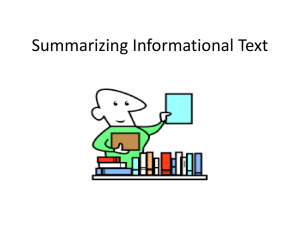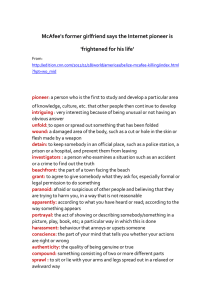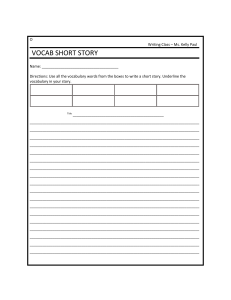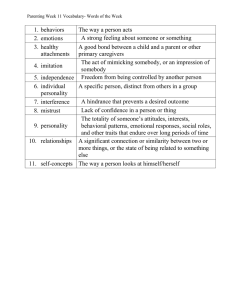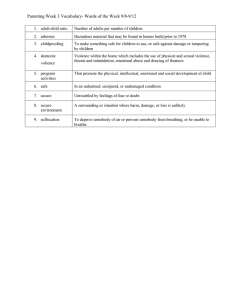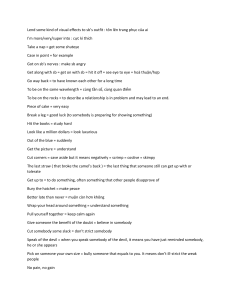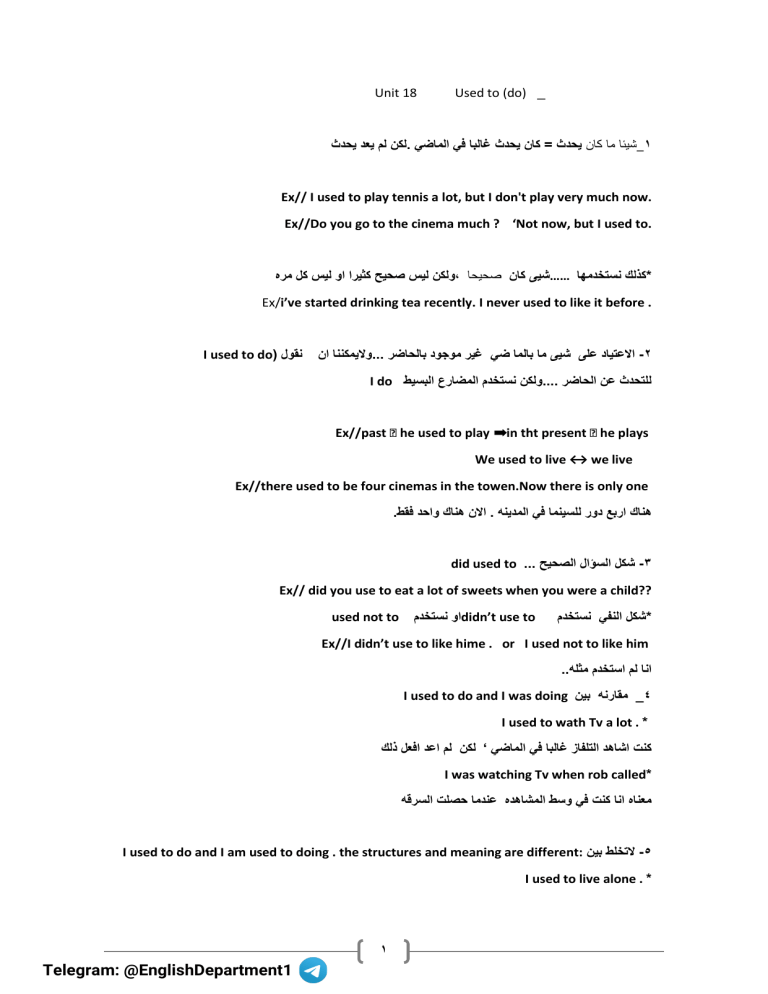
Unit 18 Used to (do) _ لكن لم ٌعد ٌحدث. ً_شيئا ما كان ٌحدث = كان ٌحدث ؼالبا فً الماض1 Ex// I used to play tennis a lot, but I don't play very much now. Ex//Do you go to the cinema much ? ‘Not now, but I used to. ولكن لٌس صحٌح كثٌرا او لٌس كل مره, *كذلك نستخدمها ……شٌى كان صحيحا Ex/i’ve started drinking tea recently. I never used to like it before . I used to do( نقول والٌمكننا ان... االعتٌاد على شٌى ما بالما ضً ؼٌر موجود بالحاضر-2 I do ولكن نستخدم المضارع البسٌط.... للتحدث عن الحاضر Ex//past ⏩ he used to play ➡in tht present ⏩ he plays We used to live ↔ we live Ex//there used to be four cinemas in the towen.Now there is only one . االن هناك واحد فقط. هناك اربع دور للسٌنما فً المدٌنه did used to ... شكل السؤال الصحٌح-3 Ex// did you use to eat a lot of sweets when you were a child?? used not to او نستخدمdidn’t use to *شكل النفً نستخدم Ex//I didn’t use to like hime . or I used not to like him ..انا لم استخدم مثله I used to do and I was doing _ مقارنه بٌن4 I used to wath Tv a lot . * كنت اشاهد التلفاز ؼالبا فً الماضً ‘ لكن لم اعد افعل ذلك I was watching Tv when rob called* معناه انا كنت فً وسط المشاهده عندما حصلت السرقه I used to do and I am used to doing . the structures and meaning are different: التخلط بٌن-5 I used to live alone . * 1 Telegram: @EnglishDepartment1 . لكن لم ٌعد ٌعٌش وحده. ًعاش وحٌدا فً الماض I am used to living alone .* ...انا اعٌش وحدي و الاجد ؼرابه او صعوبه الانً كنت اعٌش وحدي لبعض الوقت Unit 19 / present tenses / I am doing / I di/for the future صٌؽة المضارع للتعبٌر عن المستقبل present continuous (I am doing ) with a future meaning _1 المضارع المستمر مع معنى المستقبل او التعبٌر عن المستقبل بالمضارع المستمر **_ I'm doing انا افعل شٌئا ؼدا = انا بالفعل قررت ورتبت لفعل ذلك....وتستخدم عندما نقول Ex//I'm going to the theatre .(not I go) Ex//what time is katherine arriving tomorrow ?? Ex//steve isn't playing football next Saturday. ****I'm going to (do) is also possible in these sentences:: فً هذه الجملهgoing to (do( كذلك من الممكن استخدام What are you going to do on Saturday evening?? ماذا ستفعل ٌوم السبت مساء ؟؟ ***But the present continuous is more natural when we talk about arrangements. .ولكن المضارع المستمر هو اكثر طبٌعً عندما نتحدث عن الترتٌبات do not use will to talk about what you have arranged to do :_ .. لل الحدٌث عن ما لدٌك ترتٌب للقٌام بهwill ال تستخدم What are you doing this evening? (not what will you do). Alex is getting married next month. (not will get ) you can also use the present continuous for an action just before you begin to do it _ ٌمكنك أٌضا استخدام المضارع المستمر الاجراء العمل قبل أن تبدأ بفعله This happens especially with verbs of movement (go/come/leave ….) . Ex//I'm tired.i'm going to bed now. Goodnight. (not I go to bed now طابت لٌلتك.اتا سوؾ اذهب للفراش االن.انا متعب B_ present simple ( ido) with a future meaning )المضارع البسٌط مع المستقبل )المضارع البسٌط للتعبٌر عن المستقبل 2 Telegram: @EnglishDepartment1 We use the present simple when we talk about timetables, programmes ets. (for public ) transport ,cinemas نحن نستخدم المضارع البسٌط عندما نتحدث عن جداول زمنٌة(برامج وقتٌه معٌنه ) ,برامج نظام تتبع النفقات( .على وسائل النقل العام ,دور السٌنما) Ex//My train leaves at 11:30, so I need to be at the station by 11:15. قطاري ٌؽادر الساعه الحادٌه عشر ونصؾ .لذلك انا بحاجه الى ان اكون فً المحطه الساعه الحادٌه عشر والربع. ? Ex//what time does the film start this evening متً ٌبدا الفٌلم هذا المساء ؟؟ *** you can use the present simple to talk about people if their plans are fixed like a timetable ٌمكنك استخدام المضارع البسٌط للحدٌث عن الناس إذا كانت خططهم ثابته مثل جدول زمنً معٌن. Ex//I start my new job on Monday. انا بدت ب وضٌفتً الجدٌده ٌوم االثنٌن ?Ex//what time do you finish work tomorrow ما وقت انهاء عملك ؼدا ؟ ***But the continuous is more usual for personal arrangements : ولكن المستمر هو اكثر اعتٌادٌا مع الترتٌبات الشخصٌة . )Ex//what time are you meeting ann tomorrow? (not do you meet متى ستلتقً ب آن ؼدأ؟ Q/ Compare Between the present simple with the future and the present continuous with ??a future س/قارن بٌن المضارع البسٌط مع المستقبل والمضارع المستمر مع المستقبل؟؟ الجواب هوه المالحضات والكالم الً فوگ انتو تحلونه كل حاله ووٌن تستخدم ووٌاه مثال.. )Unit (20) _ (I'm) going to ( Do A_ I am going to do something =I have already decided to do it , I intend to do it : انااااااااااااااا سااااااااااااااوؾ افعاااااااااااااال شااااااااااااااٌئا=قد قااااااااااااااررت أن تفعاااااااااااااال ذلااااااااااااااك ,أعتاااااااااااااازم أن تفعاااااااااااااال ذلااااااااااااااك: لدٌك العزٌمه على فعل شٌى ما . Ex//are you to eat anything ? no , I'm not hungry. هل تتناول اي شٌى ؟ ال انا لست جائع. ? Ex//I'm just going to make a quick phone call. Can you wait for me أنا ذاهب لمجرد إجراء مكالمة هاتفٌة سرٌعة .اتستطٌع انتضاري؟ Ex//This cheese smells horrible. I'm not going to eat it. هذا الجبن ذو روائح كرٌه .انا لن اكله . 3 Telegram: @EnglishDepartment1 B_i am doing and I am going to do We use I am doing (present continuous) when we say what we have arranged to do _for example arranged to meet somebody ,arranged to go somewhere: نحااان نساااتخدم أناااا س اقاااوم (المضاااارع مساااتمر) عنااادما نقاااول لااادٌنا ترتٌاااب ماااا للقٌاااام باااه او فعلاااه_..على سااابٌل المثال الترتٌب للقاء شخص ما ,الترتٌب للذهاب لمكان ما : ? Ex// what time are you meeting ann this evening متى تلتقً ب آن فً هذا المساء (اي وقت)؟ Ex// I'm leaving tomorrow . I 've my plane ticket. انا س اذهب ؼدا انا حصلت على تذكرة الطائرة *** I am going to do something =I have decided to do it (but perhaps not arranged )to do it انا قررت ان افعل شٌأ = لقد قررت ان افعل ذلك (لكن الٌوجد ترتٌب لفعل ذلك) اي انا قررت ان افعل شى ما وقررت على فعله لكن لم ارتب الوقت او المكان لحد االن : Ex// I have decided not to stay here any longer . tomorrow I'm going to look for somewhere else to stay. لقد قررت عدم البقاء هنا أكثر من ذلك .ؼدا سأذهب للبحث عن مكان آخر للبقاء. ال ٌرٌد البقاء هنا اكثر وسوؾ ٌذهب ؼدا للبحث عن ماكن لكن لم ٌحدد ؼدا بااي وقت هو سوؾ ٌذهب.. Note: often the difference is very small and either form is possible . ؼالبا ما ٌكون الفرق هو صؽٌر جدا او شكل ممكن.. C_ you can also say that something is going to happen in the future. كذلك ٌمكنك القول شًء ما سوؾ ٌحدث فً المستقبل. اناااا ذاهاااب الاتمشاااى مامعنااااه هناااا اناااً بهااااي اللحظاااه دااتمشاااى وبالمساااتقبل هااام دااتمشاااى ٌعناااً اوصااال لفاااد نقطاااه بالمستقبل )Ex// look at those black clouds ! it's going to rain (the clouds are there now انظر إلى تلك السحب السوداء ! انها سوؾ تمطر (السحاب هناك االن) Ex// the economic situation is bad now and things are going to get worse . الوضع االقتصادي سًء اآلن واألمور تسٌر الى االسوء. D_ I was going to do something =I intended to so it, but didn't do it : انا كنت ذاهب لفعل شٌى = كنت انوي ذلك .لكن لم افعل ذلك . الذهاب لفعل شٌى ما و والنٌه لفعل هذا الشٌى لكنً لكنً لم استطٌع فعل هذا الشٌى . 4 Telegram: @EnglishDepartment1 Ex// we were going to travel by train , but then we decided to go by car instead نحن ذاهبون إلى السفر بالقطار ,ولكن بعد ذلك قررنا الذهاب بالسٌارة بدال من ذلك Ex// I was just going to do the exam, but he changed his mind. كنت مجرد ذاهب للقٌام ب االمتحان .لكنً ؼٌرت رئًٌ **you can say that something was going to happen (but didn't happen): ٌمكن القول أن شٌئا ما سٌحدث (ولكن لم ٌحدث): Ex// I thought it was going to rain .but it didn't اعتقدت انها على وشك المطر .لكن ذلك لم ٌحدث... #الكتابة والترجمة تمت من قبلً الطالب علً ناهً كبر )UNIT (42_ passive 1) (is done / was done **المبنً للمجهول هوه حدث او فعل نجهل من الذي قام به او النعرؾ من الذي قام بالفعل الن الجمله التحتوي على فاعل كما فً اللؽه العربٌه ولكن هنا ٌوجد اختالؾ فً الحالت واالزمنه سوؾ نتطرق الٌها ان شاء هللا... 👇👇👇👇Ex// )1_The director will give you instructions (act )Instructions will be given to you by the director(pass سوؾ ٌعطٌك مدٌر التعلٌمات سٌتم تقدٌم التعلٌمات لك من قبل المدٌر 1_I make a cake. A cake is made (by me). نالحظ فً جمل المبنً للمجهول الفاعل مجهول ...فً المثال االول النعرؾ من هو المدٌر الذي سوؾ ٌقدم التعلٌمات لك.وفً المثال الثانً فً جملة المبنً للمجهول الكٌكه صنعت النعرؾ من الذي قام بصنعها.. _A ** when we use an active verb , we say what the subject does : عندما نستخدم فعل النشاط(فعل حدث) .نحن نقول ما الموضوع Ex// my grandfather was a builder. He built in 1991. 5 Telegram: @EnglishDepartment1 1961 ًهوه بنى ف.)جدي كان بنأء (خلفه) (معماري **when we use the passive verb , we say what happens to the subject: . نحن نقول ماٌحدث للموضوع. عند استخدامنا فعل المجهول Ex// how f is this house ? it was built in 1961 1961 كم عمر هذا البٌت؟ تم بناؤه فً عام B_ **when we use the passive , who or what causes the action is often unknown or unimportant. .الذي او ما ٌسبب العمل هو فً كثٌر من األحٌان ؼٌر معروؾ أو ؼٌر مهم.عندما نستخدم المجهول Ex/ A lot of money was stolen in the robbery. (some body stole it, but we don't know who) ) ولكننا ال نعرؾ من, (سرق شخص ما ذلك.وقد سرق الكثٌر من المال فً السرقة **if we want to say who dose or what causes the action ,we use by : By= تعنً من قبل : ونحن نستخدم من قبل,إذا أردنا أن نقول من جرى أو ما ٌسبب العمل Ex// this house was built by my grandfather وقد بنً هذا المنزل من قبل جدي C_the passive is be (is/was ) + past participle (done / cleaned / seen ): )be) done cleaned damaged built seen For irregular past participles (done/seen/know) see Appendix 1 . 1 عرؾ) انظر الملحق/رى/ لل تصارٌؾ الؽٌر نضامٌه فً الماضً (فعل Study the active and passive forms of the present simple and past simple : ...دراسة اشكال االنشطه(االفعال) الحالٌه والمبنً للمجهول من المضارع البسٌط والماضً البسٌط .**دراسة االفعال الحالٌه والمبنٌه للمجهول كال على حدى مع المضارع البسٌط والماضً البسٌط **present simple Active clean(s) / see (s) etc. somebody cleans this room every day Passive am/is/are +cleaned /seen (participle) this room is cleaned every day الفرق بٌن المبنً للمجهول والحد النشط اي الحدث الحالً هوه الحدث الحالً من المحتمل ان نعرؾ من الفاعل الذي قام بالحدث ولكن المبنً للمجهول هوه ؼٌر معروؾ وحدث حدث مسبقا Ex// many accidents are caused by careless driving 6 Telegram: @EnglishDepartment1 العدٌد من الحوادث الناجمة عن القٌادة المتهوره Ex//I'm not invited to parties very often ...انا لست مدعو الى الحفالت فً الكثٌر من االحٌان **past simple Active cleaned/saw… somebody cleaned this room yesterday. Passive was/were+cleaned / seen… this room was cleaned yesterday. Ex//we were woken up by a loud noise during the night. .استٌقظنا بصوت عال خالل اللٌلpassive لوجودwere والتصرٌؾ للفعلwoken Ex// did you go to the party? No, I wasn't invited. ..ً ال لم تتم دعوت.تذهب الى الحفلة طبعا شرحً هو... مالحظات حول المبنً للمجهول واستخدامه مع الماضً البسٌط والمظارع البسٌط42 ٌونت ...لمالحظات الكتاب UNIT (43) passive 2 (be done /been do/ being done) ًهنا فً هذه الوحده شكل المبنً للمجهول الثان Active and passive forms: A_ infinitiveصٌؽة المصدر Active (to) do/clean/see somebody will clean this room later Passive (to) be+done /cleaned / seen.. this room will be cleaned later. Ex//a mystery is something that can't be explained. .الؽز أمر ال ٌمكن تفسٌرpassive Ex//please go away. I want to be left alone انا ارٌد ان ابقى وحٌدا.إذهب بعٌدا من فضلك B_ perfect infinitive .. صٌؽة المصدر التام Active (to) have + done/cleaned /seen.. somebody should have cleaned the room 7 Telegram: @EnglishDepartment1 Passive (to)have been + done/ cleaned / seen.. the room should have been cleaned . Ex// I should have received the letter by now. It might have been sent to the wrong address قد ٌكون قد تم إرسالها إلى عنوان خاطئ.كان ٌنبؽً أن أتلقى الرسالة اآلن من..الجمله االولى متكونهI should have received قاعدة اactive والتكملة هً قاعدة المبنً للمجهول الن ...اي مجهول ومن صٌاغ القاعده نفهم الكالم...معنى الكالم قد تم ارسالها الى عنوان خاطى النعرؾ العنوان Ex//there were some problems at first ,but they seem to have been solved. .... ولكن ٌبدو أنها تم حلها,كانت هناك بعض المشاكل فً البداٌة ....اي المشاكل سبق وقد تم حلها C _ perfect : Present perfect :: المضارع التام Active have/has + done .. the room looks nice . somebody has cleaned it Passive have/has been + done the room looks nice. It has been cleaned. Ex// have you heard ? the trip had been cancelled. .هل سمعت ؟ تم إلؽاء الرحلة Ex// are you going to the party ? No I haven't been invited. ًهل أنت ذاهب إلى الحفله ؟ ال لم تتم دعوت Past perfect: ...الماضً التام Active had + done Passive had been + done نفس الجملة السابقه فقط وضعhad مكانhas نفس الجملة فقط تبدٌلhas بhad Ex// the vegetables didn't taste a good . they had been cooked too long . . كانت تطهى طوٌال جدا.الخضراوات لم ٌكن طعمها جٌد D_ continuous .االستمرارٌه Present continuous : المضارع المستمر Active Passive am/is/are + do (ing)* somebody is cleaning the room at the moment am/is/are +being (done) the room is being cleaned at the moment. ًاما الجمله الثانٌه المبنً للمجهول الؽرفه ٌجري تنظٌفها ف..فً الجمله االولى شخص ما نظؾ الؽرفه فً هذه اللحظه .من هو الذي ٌقوم بالتنظٌؾ استمرارٌه بالمجهول.الوقت الراهن ولكن النعلم 8 Telegram: @EnglishDepartment1 Ex// there's somebody walking behind us . I think we are being followed. هناك شخص ٌسٌر وراءنا اعتقد اننا نتبعه وامثله اخرى فً الكتاب... الماضً المستمر Past continuous : somebody was cleaning the room when I arrived was/were + (do) ing Active كان شخص ما ٌنظؾ الؽرفة عندما وصلت the room was being cleaned when I arrived )was/ were + being (done Passive تم تنظٌؾ الؽرفة عندما وصلت النعرؾ من الذي قام بتنظٌفها فً الجملة الثانٌه ..مبنً للمجهول والقواعد واضحه... فً هذه الوحده نقوم بدراسة المبنً للمجهول مرة ثانٌه ولكن مع صٌػ وازمنه مختلفه مع صٌؽة المصدر ومع صٌؽة المصدر التامه ومع المضارع التام.والماضً التام والمضارع المستمر والماضً والمستمر كال على حدى والحظنا التؽٌٌر الطفٌؾ او الواضح احٌانا فً القاعده لكل زمن ..كال بحسب زمن حدوثه و االعتماد على جملة واحده فً شرح كل المواضٌع امر هم لٌرٌك مامدى التؽٌر بٌن زمن واخر فً الجمله وفً هذه الحاله سوؾ ٌكون من السهل علٌك فهم المواضٌع...وهذه المالحظه لكل وحدات المبنً للمجهول.... UNIT (44) PASSIVE 3 الٌعنً المبنً للمجهول الثانً او الثالث هوه تؽٌٌر فً حالة المبنً للمجهول وانما هوه المبنً للمجهول نفسه وانام مع ادوات وازمنه مختلفه... _A … I was offered …. / we were given انا عرضت / ...تم اعطائنا... ** some verb can have tow objects . ex// give Ex// some body gave the police the information . tow obj شخص ما اعطى المعلومات للشرطه اي المعلومات اعطٌت بواسطة شخص ما ** so it is possible to make tow passive sentences : لذلك فمن الممكن اعطاء جملتٌن بالمبنً للمجهول ...اي جملتٌن مبنً للمجهول بتركٌبه مختلفه.. Ex// the police were given the information . or The information was given to the police . 👆👆👆جملتٌن فً المبنً للمجهول ومن الممكن قلبهما.. Other verb which can have tow objects are : 9 Telegram: @EnglishDepartment1 افعال اخرى ٌمكن اٌن ٌكون لها موضوعٌن tell teach show pay offer Ask **when we use these verbs in the passive , most often we begin with the person : عندما نستخدم هذه األفعال فً المبنً للمجهول ,وؼالبا ما نبدأ مع ذلك الشخص؛ Ex// I've been offered the job , but I don't think I'll accept it . لقد عرضت علً الوظٌفة ,ولكنً ال أعتقد أننً سوؾ أقبل ذلك(.عرضو علً الوضٌفه اي مسبقا) امثله اخرى بالكتاب Ex// انا الاحب ; B_ I don't like being The passive of doing / seeing … is being done / being seen … compare : المبنً للمجهول للقٌام /رؤٌة ٌ ...جري ٌ /نظر ...مقارنه: I don't like people telling me what to do Active الاحب الناس الذٌن ٌقولون لً ماٌجب ان افعل I don't like being told what to do Passive أنا ال أحب أن ٌقال ما ٌجب القٌام به ....هنا لم ٌحدد من الناس والشخص معٌن القائل هنا مجهول اي اي احد ٌقول لً …الاحبه ....والقاعده هً نفسها مجرد تؽٌٌر بسٌط بزمن الجمله حته تصبح مجهوله بزمن االستمرارٌه Ex// I remember being taken to the zoo when I was a child. أتذكر أنه أخذنً إلى حدٌقة الحٌوان عندما كنت طفال .مبنٌه للمجهول Somebody taking me to the zoo.. اتذكر شخص ما اخذنً للحدٌقه ولكن الجمله االصلٌه هً مبنٌه للمجهول وهذا هو معناه المعلوم امثله اضافٌه بالكتاب Ex// ولدتو C_ I was born ماضً..هنا... ) We say I was born …. (not I am born wasنحن نقول انا ولدتّ ...والنقول انا ولدت اي نقول انا ولدتو فً زمن الماضً ب استخدام In the past: ?Ex// where were you born?. Not say where are you born Ex//I was born in iraq.. فً المضارع In the present 10 Telegram: @EnglishDepartment1 ?Ex//how many babies are born every day كم عدد األطفال الذٌن ٌولدون كل ٌوم؟ اي فً الوقت الحالً ولٌس فً الماضً وهنا عرفنا استخدام born :احصل علىD_ Get **you can use get instead of be in the passive . ٌمكنك استخدام الحصول على بدال من ٌكون فً المبنً للمجهول.. فً المبنً للمجهولbe .بدالل من getاي من الممكن استخدام Ex// I don't get invited to many parties . =I'm no invited انا الاحصل على دعوه للكثٌر من الحفالت = انا لم ادعى هنا الجمله اٌظا بزمن المبنً للمجهول. **we use get only when things happen. نحن نستخدم الحصول على عندما نتحدث عن امور تحدث فقط. For example ,you cannot use get in these sentences : على سبٌل المثال ,ال ٌمكنك استخدام الحصول على فً هذه الجمل: Ex// jessica is liked by everybody . جٌسٌكا هو محبوبا من قبل كل شخص. Not gest liked . this is not a happening . الاحب احد ٌحب ....هذا لٌس حدثا لذلك لم نستخدم الحصول على هنا .. **we use get mainly in informal spoken english . you can use be in all situations . نحن نستخدم الحصول على بشكل رئٌسً فً االحداث الؽٌر رسمٌه فً اللؽه االنگلٌزٌه .نحن نستطٌع استخدام ٌكون فً كل الحاالت اي ٌكون نستطٌع استخدامها فً كل الحاالت ولٌس فً حاله معٌنه لٌس مثل الحقول على.. طلق get divorced .تزوجGet married . الحصول على ) get dressed (put on your clothes االرتداء (هنا فقط الحاله على مالبسك ولٌس االرتداء على كل الحاالت) اي هنا الحصول على تستخدم فً حاالت معٌنه ولٌست عمومٌه. )Get changed (change your clothes الحصول على تؽٌٌر...فً مالبسك فقط... 11 Telegram: @EnglishDepartment1 مع...اضافات خارجٌه لتوضٌح المبنً للمجهول عندما ٌاتً مع االزمنه االخرى ولماذا نستخدم المبنً للمجهول واٌن ...االمثله ٌاربً تستفادون منه The Passive Voice Let’s look at this sentence: This is an active sentence and it has the subject first (the person or thing that does the verb), followed by the verb, and finally the object (the person or thing that the action happens to). So, in this example, the subject is 'I', the verb is 'drank' and the object is 'two cups of coffee'. But, we don't always need to make sentences this way. We might want to put the object first, or perhaps we don't want to say who did something. This can happen for lots of reasons (see the explanation further down the page). In this case, we can use a passive, which puts the object first: With my best wishes to you How to make the Passive in English We make the passive by putting the verb 'to be' into whatever tense we need and then adding the past participle. For regular verbs, we make the past participle by adding 'ed' to the infinitive. So ‘play’ becomes ‘played’. Tense Active Passive present simple I make a cake. A cake is made (by me). present continuous I am making a cake. A cake is being made (by me). past simple I made a cake. A cake was made (by me). past continuous I was making a cake. A cake was being made(by me). present perfect I have made a cake. A cake has been made (by me). 12 Telegram: @EnglishDepartment1 present perfect continuous I have been making a cake. A cake has been being made (by me). past perfect I had made a cake. A cake had been made (by me). future simple I will make a cake. A cake will be made (by me). future perfect I will have made a cake. A cake will have been Verbs with two objects Some verbs that have two objects can make two different active sentences, and so two different passive sentences too. For example, the verb ‘give’ is like this: Active: He gave me the book / He gave the book to me. You can choose either of the two objects to be the subject of the passive sentence. Other verbs like this are: ask, offer, teach, tell, lend, promise, sell, throw. The passive in subordinate clauses You can make the passive in a subordinate clause that has a subject and a normal conjugated verb. This is really the same as a normal passive. sed John. You can also make the passive using a passive gerund or a passive infinitive in the same place as a normal gerund or infinitive. 13 Telegram: @EnglishDepartment1 When should we use the passive? 1) When we want to change the focus of the sentence: painting than the artist in this sentence) 2) When who or what causes the action is unknown or unimportant or obvious or 'people in general': t, the police). 3) In factual or scientific writing: nd the data entered into the computer. 4) In formal writing instead of using someone/ people/ they (these can be used in speaking or informal writing): 5) In order to put the new information at the end of the sentence to improve style: Bell wrote the books' sound clumsy) 6) When the subject is very long: al than: 'how well the students did in the test surprised me') 14 Telegram: @EnglishDepartment1 امثله مع حلها ال االزمنه عندما تاي مع المبنً للمجهول The Passive: Past Simple Make the sentences passive (past simple): 1. Somebody lost the letter. __The letter was lost __________________________________________ 2. Somebody found the key. _______________________________________________________________ 3. Somebody made mistakes. _______________________________________________________________ 4. Somebody loved that woman. _______________________________________________________________ 5. Somebody cleaned the rooms. _______________________________________________________________ 6. Somebody fixed the computer. _______________________________________________________________ 7. Somebody built that house. _______________________________________________________________ 8. Somebody wrote ‘War and Peace’. _______________________________________________________________ 9. Somebody painted The Mona Lisa. _______________________________________________________________ 10. Somebody stole my wallet. 11. Somebody prepared lunch. _______________________________________________________________ 12. Somebody drank a lot of coffee. _______________________________________________________________ 13. Somebody forgot the papers. _______________________________________________________________ 14. Somebody closed the windows. 15 Telegram: @EnglishDepartment1 _______________________________________________________________ 15. Somebody invited Julie and Luke to a party. _______________________________________________________________ 16. Somebody built a website. _______________________________________________________________ 17. Somebody ate all the cakes. _______________________________________________________________ 18. Somebody told me to wait. _______________________________________________________________ 19. Somebody employed a lot of new waiters. _______________________________________________________________ 20. Somebody opened a shop. الحل 1. The letter was lost. 2. The key was found. 3. Mistakes were made. 4. That woman was loved. 5. The rooms were cleaned. 6. The computer was fixed. 7. That house was built. 8. ‘War and Peace’ was written. 9. The Mona Lisa was painted. 10. My wallet was stolen. 11. Lunch was prepared. 12. A lot of coffee was drunk. 13. The papers were forgotten. 14. The windows were closed. 15. Julie and Luke were invited to a party. 16. A website was built. 17. All the cakes were eaten. 16 Telegram: @EnglishDepartment1 18. I was told to wait. 19. A lot of new waiters were employed. 20. A shop was opened. The Passive: Present Simple Make the sentences passive: 1. Somebody cleans the office every day. _The office is cleaned every day ________________________________ 2. Somebody sends emails. _______________________________________________________________ 3. Somebody cuts the grass. _______________________________________________________________ 4. Somebody prefers chocolate. _______________________________________________________________ 5. Somebody often steals cars. _______________________________________________________________ 6. Somebody plays loud music. _______________________________________________________________ 7. Somebody speaks English here. _______________________________________________________________ 8. Somebody loves the London parks. _______________________________________________________________ 9. Somebody wants staff. _______________________________________________________________ 10. Somebody writes articles. 11. Somebody loves Julie. 17 Telegram: @EnglishDepartment1 _______________________________________________________________ 12. Somebody reads a lot of books. _______________________________________________________________ 13. Somebody cooks dinner everyday. _______________________________________________________________ 14. Somebody delivers milk in the mornings. _______________________________________________________________ 15. Somebody buys flowers for the flat. _______________________________________________________________ 16. Somebody washes the cars every week. _______________________________________________________________ 17. Somebody writes a report every Friday. _______________________________________________________________ 18. Somebody fixes the roads. _______________________________________________________________ 19. Somebody builds new houses every year. _______________________________________________________________ 20. Somebody sells vegetables in the market. الحل Answers: 1. The office is cleaned every day. 2. Emails are sent. 3. The grass is cut. 4. Chocolate is preferred. 5. Cars are often stolen. 6. Loud music is played. 7. English is spoken here. 18 Telegram: @EnglishDepartment1 8. The London parks are loved. 9. Staff are wanted. 10. Articles are written. 11. Julie is loved. 12. A lot of books are read. 13. Dinner is cooked everyday. 14. Milk is delivered in the mornings. 15. Flowers are bought for the flat. 16. The cars are washed every week. 17. A report is written every Friday. 18. The roads are fixed. 19. New houses are built every year. 20. Vegetables are sold in the market. The Passive: Present Perfect Make the sentences passive: 1. Somebody has cleaned the kitchen. __The kitchen has been cleaned ________________________________ 2. Somebody has watered the plants. _______________________________________________________________ 3. Somebody has taken the money. _______________________________________________________________ 4. Somebody has bought the presents. _______________________________________________________________ 5. Somebody has finished the report. _______________________________________________________________ 6. Somebody has killed the President. 19 Telegram: @EnglishDepartment1 _______________________________________________________________ 7. Somebody has repaired the road. _______________________________________________________________ 8. Somebody has elected that man. _______________________________________________________________ 9. Somebody has learned lessons. _______________________________________________________________ 10. Somebody has fired John. 11. Somebody has ordered new books. _______________________________________________________________ 12. Somebody has prepared the meal. _______________________________________________________________ 13. Somebody has sent the email. _______________________________________________________________ 14. Somebody has eaten the strawberries. _______________________________________________________________ 15. Somebody has fixed the heating. _______________________________________________________________ 16. Somebody has made coffee. _______________________________________________________________ 17. Somebody has turned on the air conditioning. _______________________________________________________________ 18. Somebody has downloaded the song. _______________________________________________________________ 19. Somebody has rented a flat. _______________________________________________________________ 20. Somebody has booked the holiday. الحل 20 Telegram: @EnglishDepartment1 :Answers .The kitchen has been cleaned .1 .The plants have been watered .2 .The money has been taken .3 .The presents have been bought .4 .The report has been finished .5 .The President has been killed .6 .The road has been repaired .7 .That man has been elected .8 .Lessons have been learned .9 .John has been fired .10 .New books have been ordered .11 .The meal has been prepared .12 .The email has been sent .13 .The strawberries have been eaten .14 .The heating has been fixed .15 .Coffee has been made .16 .The air conditioning has been turned on .17 .The song has been downloaded .18 .A flat has been rented .19 .The holiday has been booked .20 The Passive: Future Simple Make the sentences passive: 1. Somebody will clean the windows. ___The windows will be cleaned _________________________________ 2. Somebody will meet you at the airport. _______________________________________________________________ 3. Somebody will process your application. _______________________________________________________________ 21 Telegram: @EnglishDepartment1 4. Somebody will find your glasses. _______________________________________________________________ 5. Somebody will bring food. _______________________________________________________________ 6. Somebody will help you. _______________________________________________________________ 7. Somebody will steal that bicycle. _______________________________________________________________ 8. Somebody will take your order. _______________________________________________________________ 9. Somebody will write a new book. _______________________________________________________________ 10. Somebody will build a stadium. .Somebody will collect your luggage .11 _______________________________________________________________ .Somebody will explain the plan .12 _______________________________________________________________ .Somebody will wash the floor later .13 _______________________________________________________________ . Somebody will deliver a parcel .14 _______________________________________________________________ .Somebody will drink all the juice .15 _______________________________________________________________ .Somebody will prepare everything .16 _______________________________________________________________ .Somebody will write the article next week .17 _______________________________________________________________ .Somebody will eat the chocolate .18 _______________________________________________________________ .Somebody will send the information .19 _______________________________________________________________ 22 Telegram: @EnglishDepartment1 .Somebody will call you .20 الحل Answers: 1. The windows will be cleaned 2. You will be met at the airport. 3. Your application will be processed. 4. Your glasses will be found. 5. Food will be brought. 6. You will be helped. 7. That bicycle will be stolen. 8. Your order will be taken. 9. A new book will be written. 10. A stadium will be built. 11. Your luggage will be collected. 12. The plan will be explained. 13. The floor will be washed later. 14. A parcel will be delivered . 15. All the juice will be drunk. 16. Everything will be prepared. 17. The article will be written next week. 18. The chocolate will be eaten. 19. The information will be sent. .You will be called .20 اعداد وترجمة وترتٌب الطالب علً ناهً كبر 23 Telegram: @EnglishDepartment1 مالحظة :هذا كل ما لدي لفائدتكم فان كنت مقصرا بشً فا انا طالب لدٌكم. 24 Telegram: @EnglishDepartment1
